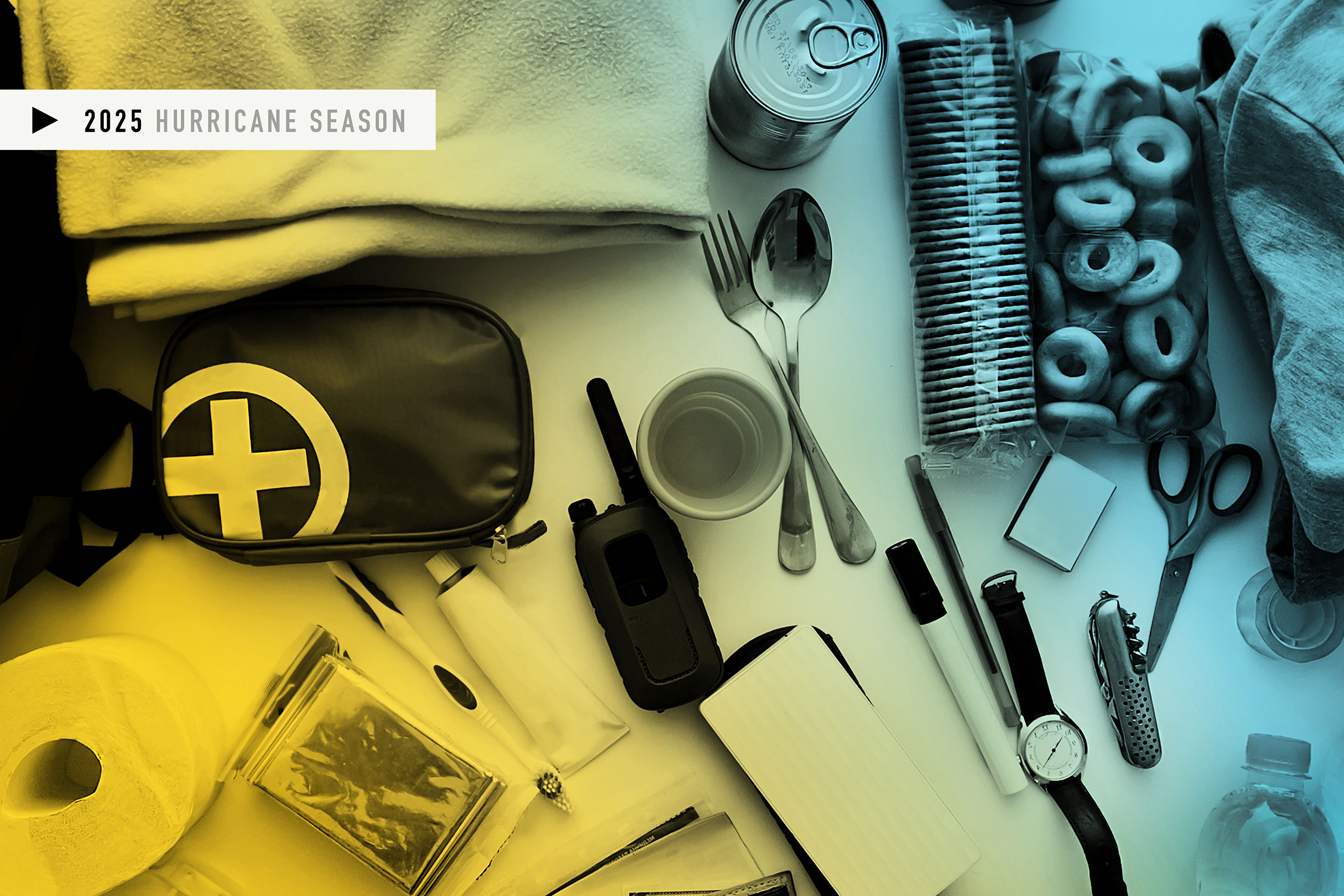Hurricane Season Is Here. What Are We in for This Year?

Summer in Houston means the resurgence of soul-sucking heat, Katy Freeway–size energy bills, and mosquitoes so brazen in their blood-sucking it’s criminal. Summer, alas, also heralds the start of the 2023 Atlantic hurricane season, which officially runs from June 1 through November 30.
Since Hurricane Harvey, Houston has managed to skate through subsequent hurricane seasons relatively unscathed. However, it still pays to be extra vigilant, and to always have an emergency kit and a plan ready to make sure your family, your pets, your home, and your livelihood are all protected in the event of inclement Gulf Coast weather.
Since our meteorology chops extend only as far as the little weather app on our phone, we called local meteorology wizard Matt Lanza of Space City Weather for some hype-free insight on what this year's hurricane season holds. Lanza answers all our brewing questions.
Houstonia: The past few hurricane seasons have been rather average for Houston. Do you have any predictions on what this year will be like?
Matt Lanza: This season, as a whole, is expected to be near average, which means roughly 12 to 15 storms and seven to nine hurricanes, with two to four of those being major hurricanes. That would be considered an average season. There's a lot of challenges this year, however.
Challenges?
For the last few years, we've had these hurricane forecasts come out before the season, and they've all been calling for active seasons—busy years. And that's because we've had a La Niña pattern in the Pacific Ocean, which just means that the water around the Equator in the Pacific has tended to be cooler than average. And we've done this now for three straight hurricane seasons. And what that does is it tends to reduce or relax wind shear in the Atlantic Ocean. Because of how the weather patterns are set up globally, it’s been a bit calmer in the Atlantic, at least in terms of wind shear, and wind shear is just what hurricanes don't want: It's hostile, and it leads to a kind of turbulence that prevents storms from forming readily. So with La Niña 's placement pattern, you have lower wind shear, and you've got a more hospitable environment for hurricanes to develop. This year, that's changed. We're finally out of the La Niña pattern. We're now moving into an El Niño pattern, which is just the opposite: warm water in the Pacific Ocean. And that increases wind shear that goes from the Pacific to the Atlantic Ocean, particularly in the Caribbean. That acts to really make it difficult for storms to develop.
So, the shift to an El Niño pattern is a good thing, right? Does that mean we should expect a milder hurricane season this year, or is it more complicated than that?
One of the challenges this year is that you're probably going to have this increase in wind shear because of El Niño, but the water in the Atlantic Ocean—across a lot of the ocean and into the Gulf—is extremely warm. Pretty much everywhere you look, the water is warmer than normal. And so that is the tug of war that's going to take place: We’re going to have the really warm water that hurricanes really like, as well as a lot of wind shear that hurricanes don't like.
You’ve charted a lot of hurricanes throughout your career. From your perspective, what is a worst-case hurricane scenario for Houston?
I think people in Houston need to understand that our threats from hurricanes are multifaceted. Harvey was definitely the worst-case scenario. Both Harvey and Allison were slow-moving tropical storms that dumped tons of rain, leading to what we call freshwater flooding, or rainfall flooding. But you know, since Ike we haven't had a storm that has had a lot of storm surge, which is another significant hazard. It can be even more dangerous than rainfall flooding. It’s been a while since we've had a storm like that. To produce that kind of storm surge a hurricane would probably need to be at least a category 2 or 3 hurricane. A worst-case scenario would be a higher-end hurricane coming in here or just north of Freeport. That's when you're talking about a catastrophic storm surge for Galveston Bay, the Houston Ship Channel, etcetera.
We are all hoping we don’t have worst-case scenarios this year, but what are some simple things people can do to make sure they are prepared if one does occur?
The first thing I think we all say is to get flood insurance, and that's good in or out of hurricane season. Keep in mind that you can't just go out and buy flood insurance and it becomes active right away; policies take some time to go into effect. The other important thing is to have a heavy supply kit, particularly if you're going to evacuate. What we always tell people is to have enough supplies for three to five days, but it should really be for a week. You should try to have a week of nonperishables and other stuff to get you through a worst-case scenario. I understand not everybody is going to be able to do that or will do that, but you should do what you can to have a little bit on hand ahead of time so you’re not fighting the crowds when the time does come.
What are some of the most important things to have in your hurricane supply kit, especially if you’re trying to put one together with a small budget?
Having water is the most essential thing, just in case something happens there. You also want a lot of nonperishable foods like cans of vegetables, fruits, and soups, things that can be used to supplement a meal. Also, have a portable, battery-powered radio.
What should you do if you’re planning on evacuating?
Having a plan is particularly important if you're in evacuation areas. Know how you're going to get out and know what route you're going to take. The more you can do of all this ahead of time, the less stressful it’s going to be. Another good tip is to have copies (digital or hard copies) of important documents for insurance and whatnot. In the event you have to evacuate, it’s also important to think about your pets, because that can become a real issue. Make sure you remember them in your plans.




